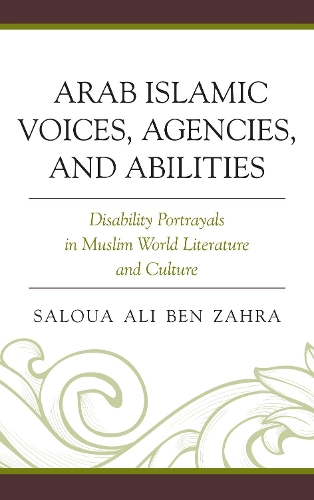
Arab Islamic Voices, Agencies, and Abilities: Disability Portrayals in Muslim World Literature and Culture
(Hardback)
Publishing Details
Arab Islamic Voices, Agencies, and Abilities: Disability Portrayals in Muslim World Literature and Culture
By (Author) Saloua Ali Ben Zahra
Bloomsbury Publishing PLC
Lexington Books
1st November 2017
United States
Classifications
Professional and Scholarly
Non Fiction
809.933527
Physical Properties
Hardback
164
Width 163mm, Height 236mm, Spine 17mm
386g
Description
This book explores portrayals and predicaments of the disabled in Arab/Muslim post colonial North African and Middle Eastern societies in genres ranging from classical Arabic scripture to secular popular culture including Francophone Moroccan and Algerian fiction, Egyptian Middle Eastern film, as well as Tunisian song and television. In line with theorists Aijaz Ahmad and Ato Quaysons objection to reading Third World literature as national allegory, The author argues that rather than being metaphors or allegories, disabled characters represent persons with disabilities in their culture and act as a mirror upon their changing societies. Contemporary Maghrebians and Muslims with disabilities find themselves at an intersection of conflicting and competing cultures, their native Islamic culture and Westernizing lifestyles. In the rush to import everything Western, despite humanitarian Islamic teachings regarding the disabled, are often abandoned. In situations of fundamentalist menace, the disabled, who tend to be the most vulnerable and abused fraction of Arab/Muslim society, suffer the worst, especially women.
Reviews
With thoughtful studies of individual works Dr. Ben Zahra has dared to compile an alternative canon of contemporary Arab literature by focusing on the portrayal of disability. She has also challenged some received truths about colonial and postcolonial periods and the curious mix of gains and losses for challenged and marginalized individuals associated with them. Dr. Ben Zahra in her book makes a convincing case for acceptance of what might have seem a niche categorythe portrayal and construction of disability in modern Arab literatureas central to discussion of Arab and North African literature and culture. -- William M. Hutchins, Appalachian State University of North Carolina
Saloua Ali Ben Zahras Arab Islamic Voices, Agencies, and Abilities: Disability Portrayals in Muslim World Literature and Culture has filled a huge gap in Disability Studies. Her work examines disability as portrayed in the Quran, Arabic films, literature and culture. The text will prove indispensable to scholars of Disability Studies and their students, adding a much needed cultural dialogue and exchange between East/West depictions and understandings of disability. The strength of the book lies in its accessibility and Dr. Zahras desire to bring forth a neglected area of Disability Studies. As the discipline thrives, so must its global examination of ableism across cultures, religions, and languages. -- Shahd Alshammari, Gulf University for Science and Technology, Kuwait
This thoughtful collection of close-readings is an important contribution to the emerging dialogue between American disability studies and contemporary North African culture. Zahras insightful and detailed analysis of a range of fictional and filmic texts reveals the complex ways in which non-normative bodies are represented, rejected and sometimes celebrated by able-bodied Arab Muslim societies. The readings of disability in the Quran offer an extremely helpful contextualization of Muslim teachings and the subsequent discussion of a wide selection of fictional depictions cleverly reveals that Arab Muslin attitudes to disability are complex and often contradictory. Zahra skillfully deploys her extensive knowledge of the works of a range of American disability studies theorists to weave an insightful and persuasive commentary of her chosen texts which is particularly effective in its discussions of the intersections of gender and disability. -- Hannah Thompson, Royal Holloway, University of London
Author Bio
Saloua Ali Ben Zahra is assistant professor of Arabic culture, language and literature in translation at Appalachian State University.
